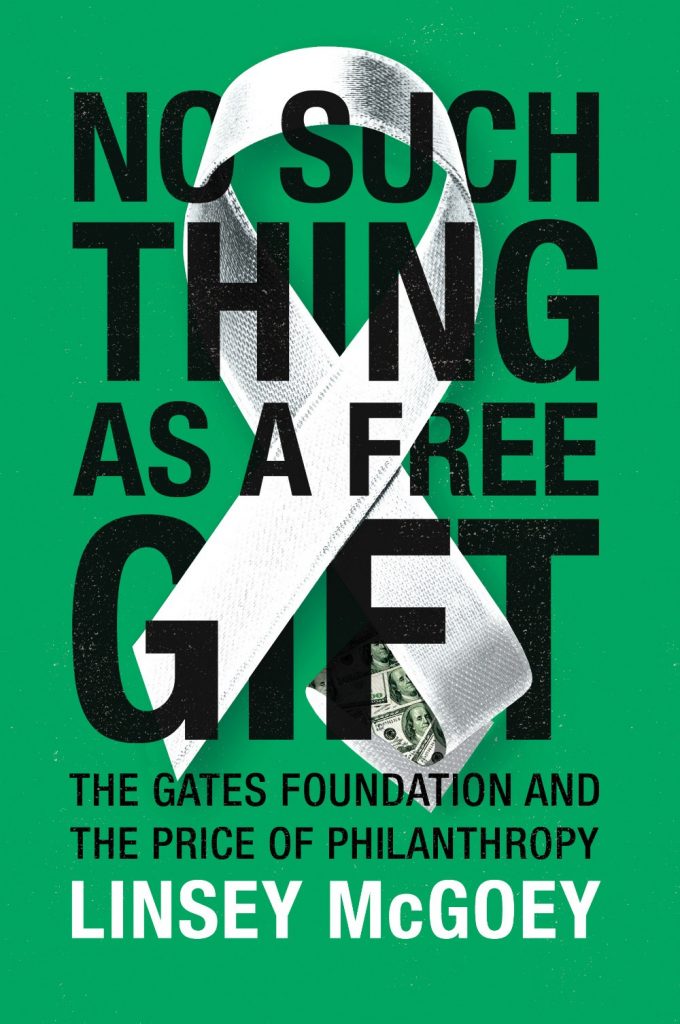Today is #exposebillgates day. At the time of writing this is trending on Twitter with almost 100,000 tweets. (And who knows is that number is accurate or not!)
If you’re new here I would recommend reading Bill Gates: Is He Good or Evil? first.
If you don’t do that, or just need a quick refresher, in that post I detail how we can lump Gates into four possible categories depending on what set of information we look at.
- There’s the saintly philanthropist.
- There’s the regular human being with both virtues and flaws.
- There’s the money and power hungry sociopath.
- And there’s “evil” category in which I lump: eugenicist and/or satanist and/or pedophile.
I’m not here to tell you what to believe. Lord knows we’ve got enough people doing that! I’m here to present information and help you to draw your own conclusions.
There are plenty of people that are calling Gates evil! The problem with that is that it is increasing polarization.
This recent video from JP Sears covers the left vs. the right. “It’s obvious that more division is the solution to all our problems”
But this just as well could be any other polarizing topic…such as Bill Gates.
How many people are not willing to accept Bill Gates is anything but a saintly philanthropist because the criticisms sound so unbelievable?
He gives away more money then anyone so he must be the best ever , right?
How many people dive straight into the deepest, darkest conspiracy theories about Gates…thus making most people immediately dismiss it?
A nuanced discussion. That’s what we need more of right now…in SO MANY different areas.
So let’s look at a criticism of Gates and his Foundation that is NON-conspiratorial.
I’m pulling a lot of information here from No Such Thing as a Free Gift: The Gates Foundation and the Price of Philanthropy by Linsey McGoey. All of the following quotes are from this book, unless otherwise noted.
This book stretched my thinking out of the polarized zones to how Gates may better fit in the middle, either categories #2 or #3. But you be the judge for yourself…
Problems with Philanthropy and Foundations
I discussed some of the problems of philanthropy non necessarily being philanthropy in my earlier article about Robber Baron Philanthropists. This book similarly looks at John D. Rockefeller, Andrew Carnegie, Henry Ford and many others.
The main hypothesis here seems to be, even with completely philanthropic intentions, is philanthropy working?
“Critics of philanthrocapitalism raise three main concerns. The first centres on the accountability and transparency of private philanthropic players – or lack thereof…The Gates Foundation…is accountable to no one other than its three trustees: Bill, Melinda, and Berkshire Hathaway CEO Warren Buffett….The second concern is that philanthropy, by channelling private funds towards public services, erodes support for governmental spending on health and education…The third major concern is that many philanthropists, both today and in the past, earned their fortunes through business strategies that greatly exacerbate the same social and economic inequalities that philanthropists purport to remedy.”
To me TRANSPARENCY is one of the most important topics. Without transparency, things can be hidden. At the very least this gives rise to conspiracy theories. At the best, this allows true conspiracies to thrive.
John Perkins, former economic hitman, made the same criticism of foundations. Why use ruthless business practices, paying low wages to workers as Rockefeller and Carnegie did, only to give away the money later? Why stifle competition to make more money like they and Gates did to consolidate profits?
“What’s remarkable about the growing number of foundations over the past two decades is that they haven’t had any effect on reducing economic inequality. In fact the opposite appears to be the case. What to make of the fact that growing philanthropy and growing inequality seem to go hand in hand? Does philanthropy actually make the rich richer and the poor poorer?”
Growing inequality is a problem…one that leads to revolution in time. Should we look at this as the main indicator that philanthropy as its being done today is NOT working?
(As many people are pointing out right now, why is it that mega-businesses Amazon and Walmart get to stay open while small business that sell the same things are shut down?)
“The Gates Foundation frequently offers grants to for-profit companies such as, to name just three recent beneficiaries, Vodacom, Ogilvy, and ABC News (which is owned by Disney and which pays many of its news staff seven- and eight-figure salaries). Charity law in the US does not prohibit direct grants from a private philanthropist to for-profit companies…On its website, the Gates Foundation emphasizes that the Gates’s tax savings are minor in comparison to their disbursements, and that’s true. The website notes that from 1994 to 2006, Bill and Melinda donated more than $26 billion, resulting in savings of 8.3 per cent, or just over $2 billion. And yet, is a gift from the Gates Foundation to a highly profitable company really the best use of money that, if it had been taxed as income rather than placed in a trust, could have benefited federal or state relief programmes?”
This is a piece we’ll be coming back to. Did you know that tax-deductible grants can go to for-profit companies? This can then be used in a variety of self-serving ways where conflicts of interests are apparent.
“In their 2002 article ‘The Competitive Advantage of Corporate Philanthropy’, Kramer and Porter asserted that to be genuinely ‘philanthropic’, corporations should deliberately pursue philanthropic strategies that align with their own financial goals. This, they suggest, would ensure that companies obtain a ‘competitive edge’ through giving, helping them to earn greater financial returns as a direct result of their charitable endeavors.” (emphasis added)
Part of the problem in our world is fiduciary responsibility of corporations meant to maximize profits for their shareholders, without caring for environmental concerns or people. This philosophy has even made its way into the charitable sector.
If you can be philanthropic in a self-interested way that increases your competitiveness and financial returns, doesn’t that become necessary to increase shareholder value? But is this really philanthropy in any sense of the word, anymore?
Funding Media
To me, this is probably the most important part as I’ve been investigating propaganda and narrative control (and will be continuing too in the near future).
In other words if you are engaging in non-transparent, conflicted interest or even worse things, how do you get away from it?
By funding the media of course!
“For decades, health activists in the US and internationally have suggested that current patent laws are a significant obstacle to achieving worldwide access to affordable medicines. Bill Gates does not agree. And his outspoken views on patents, combined with enormous cash injections towards the health policies he prefers, may have single-handedly thwarted efforts to open pharmaceutical markets to more generic competition. The influential health scholar James Love has noted the problem concisely: ‘[The Gates Foundation] funds most of the journalism on this topic, and they have been hardline advocates for strong patent protection, since the 1990s.’…Through his foundation, he’s spent hundreds of millions in tax-deductible grants to convey the public message that aid ‘works’.” (emphasis added)
If you can fund not only the programs you want, but the coverage of said programs, doesn’t that give you a bit too much power?
From the Gates Foundation 2018 annual report we see a large chunk, half a billion dollars goes towards Global Policy and Advocacy.
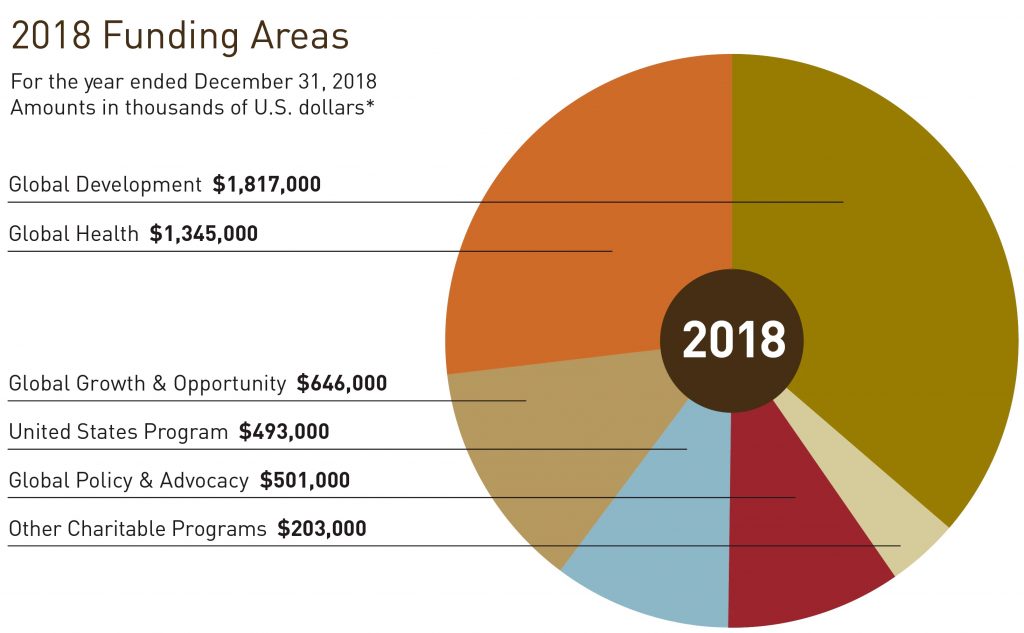
Here you can see that broken down.
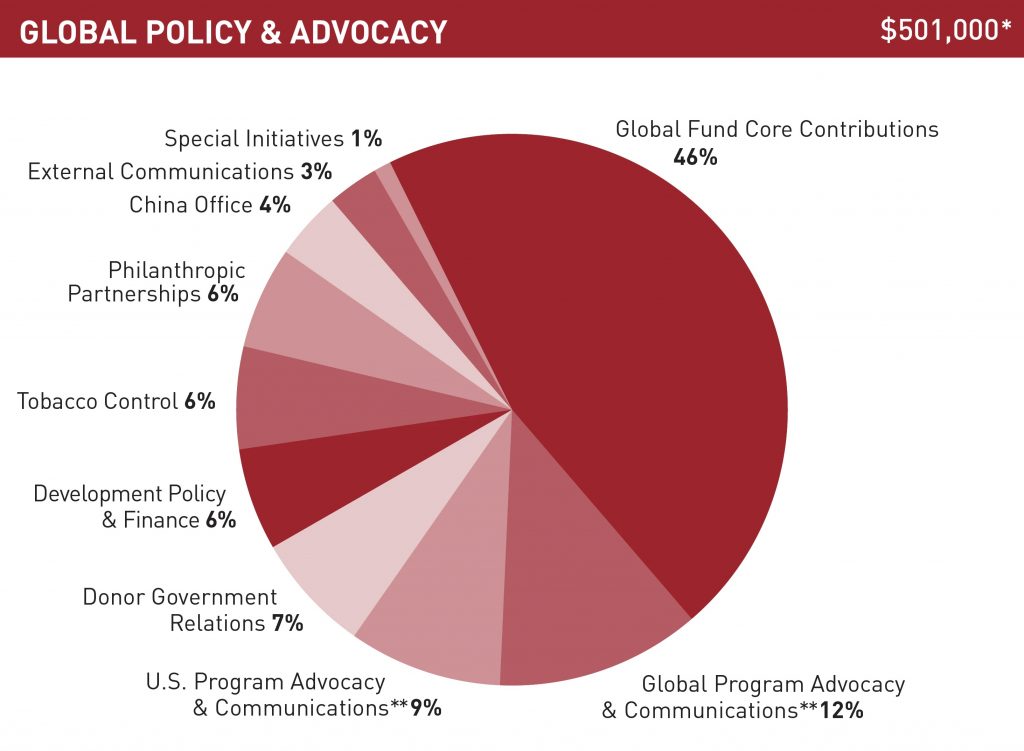
Now, this is certainly covering much more than just funding to media but that’s in there. Here’s an example from a previous year:
“In the early months of 2013, the Gates Foundation hosted a ‘strategic media partners’ meeting at its headquarters in Seattle – representatives from the New York Times, the Guardian, NBC, NPR, and the Seattle Times all came. The aim of the event writes Tom Paulson, a Seattle-based reporter, was to ‘improve the narrative’ of media coverage of global aid and development, highlighting good news stories rather than tales of waste or corruption. In 2013, the foundation gave Ogilvy, a global public relations firm, a $100,000 grant for a project titled ‘Aid is Working: Tell the World’. Ogilvy PR is part of Ogilvy and Mather, one of the largest marketing companies in the world. That Ogilvy is a beneficiary of Gates Foundation largesse raises the same question as does its grants to Vodacom: why can’t a highly profitable company cover its own marketing or business-expansion efforts. And, secondly, if aid flows are working well, why do they need a masterful PR campaign to convey that message effectively?…Can aid really be said to be working when US and EU subsidies and import controls continue to thwart African growth? Can we be as sanguine as Gates is about current patent rules when poor and middle-income nations are leading the charge to alter them?” (emphasis added)
Remember that before Bill Gates was seen as a philanthropist, he was a ruthless businessman. Everyone agrees with this! What were the business tactics involved with the press back then?
“Resentful of negative press attention to the company’s business tactics, Microsoft’s management adopted a practice of blacklisting journalists. John Dvorak, a columnist at PC Magazine, describes how Microsoft management would list reporters on a whiteboard with the comments ‘Okay’, ‘Sketchy’, or ‘Needs Work’. Many reports believed, Dvorak writes, that if you ended up in the ‘needs work’ category, Microsoft would take pains to try and have you fired. Dvorak himself ended up on Microsoft’s blacklist, something he only realized because of documents unearthed during the discovery process of the Comes v. Microsoft lawsuit in Iowa. Dvorak adds, rather dryly, that while Microsoft failed to completely unseat him, threats from the company did succeed in seeing him removed as a licensed columnist for PC Magazine Italy.” (emphasis added)
I think it is a sign that things are wrong when people can’t talk publicly about things for fear of backlash. When we hear about this in relation to a philanthropic foundation, something must surely be off.
“He emphasized the need to protect his identity due to concerns over a backlash from the Gates Foundation. ‘Maybe I’m a paranoid guy,’ he said. ‘But I’m scared out of my mind talking to you right now.’…Gates Foundation’s funding of media outlets leads journalists to censor negative criticism; those in the field refer to the problem as the ‘Bill Chill Effect’. Anna made this point: ‘You have a foundation that is essentially paying for areas that it wants to pursue, and also supporting otherwise independent international agencies or norm-setting agencies. Once you have them on the payroll, their voices are compromised. That’s why you’re not going to get anyone to talk on the record…[this] reality has to come to light.’” (emphasis added)
Alan Mccleod of MintPressNews, an independent news site, wrote that the “Gates Foundation underwrites the entire Global Development section of the Guardian, and has given the British newspaper over $9 million. Studying its donation database, it transpires it has also contributed over $3 million to NBC Universal, over $4 million to the influential French newspaper, Le Monde, over $4.5 million to NPR, $1 million to Al-Jazeera, and an astonishing $49 million to the BBC’s Media Action program, to name only a few…Gates himself is the head of a gigantic media empire. We already rely on Microsoft for social media (LinkedIn), entertainment (Xbox), hardware and software like the Windows Phone and Windows OS. The company also owns stakes in media giants like Comcast and AT&T. And the “MS” in “MSNBC” stands for “Microsoft.””
This is why we see such glowing pieces about the Gates Foundation in many places. This is the public relations that makes “everyone” know that Bill Gates is a saintly philanthropist.
Such conflicts of interest are seldom if ever disclosed. Tim Schwab at The Nation did a great article called “Bill Gate’s Charity Paradox”. He starts off talking about the Netflix series, Inside Bill’s Brain, which, “underlines Gates’s expansive intellect by interviewing Bernie Noe, described as a friend of Gates. “That’s a gift, to read 150 pages an hour,” says Noe. “I’m going to say it’s 90 percent retention. Kind of extraordinary.” [Director Davis] Guggenheim doesn’t tell audiences that Noe is the principal of Lakeside School, a private institution to which the Bill & Melinda Gates Foundation has given $80 million. The filmmaker also doesn’t mention the extraordinary conflict of interest this presents: The Gateses used their charitable foundation to enrich the private school their children attend, which charges students $35,000 a year.”
We need to look at not just financial conflicts of interest in business and charity, but media conflicts of interest too.
Gates Foundation on Education
While most of the attention gets pin on areas surrounding health, let’s not forget that The Gates Foundation has been involved in education for a long time.
“In 1997, Gates expanded into education. Through a gift of $200 million, he established a second fund, the Gates Library Foundation. The Library Foundation built on an earlier programme initiated at Microsoft – donating personal computer software to libraries. The donation of Microsoft equipment raised eyebrows among some critics. The late historian Theodore Roszak suggested that ‘this doesn’t even count as philanthropy. It’s just seeding the market. You’re simply lubricating future sales.’”
Charitable donations that bring about future sales…a great business tactic. But not the most ethical, most people would agree.
“[T]he New York Times ran an op-ed in which Gates was described as ‘the real secretary of education.’…The Gates Foundation is now the largest philanthropic support of US primary and secondary education.”
“Diane Ravitch, a historian and former US assistant secretary of education during the administration of George Bush Sr., has suggested that US public education is being undermine by a select group of philanthropists she calls ‘the Billionaire Boys Club’. Never before, she suggests, has a single group of philanthropists had such a strong reshaping national education policy. And the most influential of them all is Bill Gates.”
There are tons of details in the book about No Child Left Behind with its standardized testing, Common Core, ranking teachers effectiveness that I won’t get into that the Gates Foundation has supported. Read the book if you want more. Just to sum up, none of those covered in the book have worked well!
“When it comes to public education in the US, there’s little indication yet that many of the initiatives the foundation has spearheaded have in fact been positive for students. Despite a history of policy reversals and failed efforts, the foundation continues to be upheld as an exemplary and uniquely results-oriented organization. And there’s nothing stopping the foundation from itself promoting that perception of its work, a problem that irks teachers. One former teacher, Anthony Cody, summarized this concern clearly in an interview with Valerie Strauss of the Washington Post: I have found it remarkable that an education reform project built around the concept of ‘accountability’ has no mechanism, no means by which we, the public, can hold its sponsors accountable. We have ‘bad teachers’ who must be held accountable. Schools and students that must be held accountable. But Bill Gates himself? Who holds him and his employees accountable for the devastating effects their reforms have had?’ The answer is no one.”
In Microsoft, Bill was accountable to shareholders. He was also accountable to governments for breaking anti-trust laws as ultimately occurred. But with his foundation, as there is far less scrutiny, it looks like he is less accountable than ever before. There is no anti-trust equivalent with foundations.
The Foundations Financial Investments
“Mitch Kapor, the billionaire founder of Lotus software, expressed to me his surprise and dismay at Gates’s intransigency on the topic of ethical investing: ‘The Gates Foundation manages its endowment along conventional lines, i.e., it does not pay attention to mission or impact. I recently spoke to Bill about this and he spoke about this fact as though it were out of his hands and that he didn’t have the ability to change the approach to investment.”
This is similar to the line of reasoning behind treating employees and customers well in growing a business, versus being ruthless in order to win. Here we see that the foundations investment is only about return, rather to consider what a business may be causing in the world (its mission and impact).
How you can say you’re interested in health if you are so heavily invested in health-destroying companies? At the very least it is hypocritical.
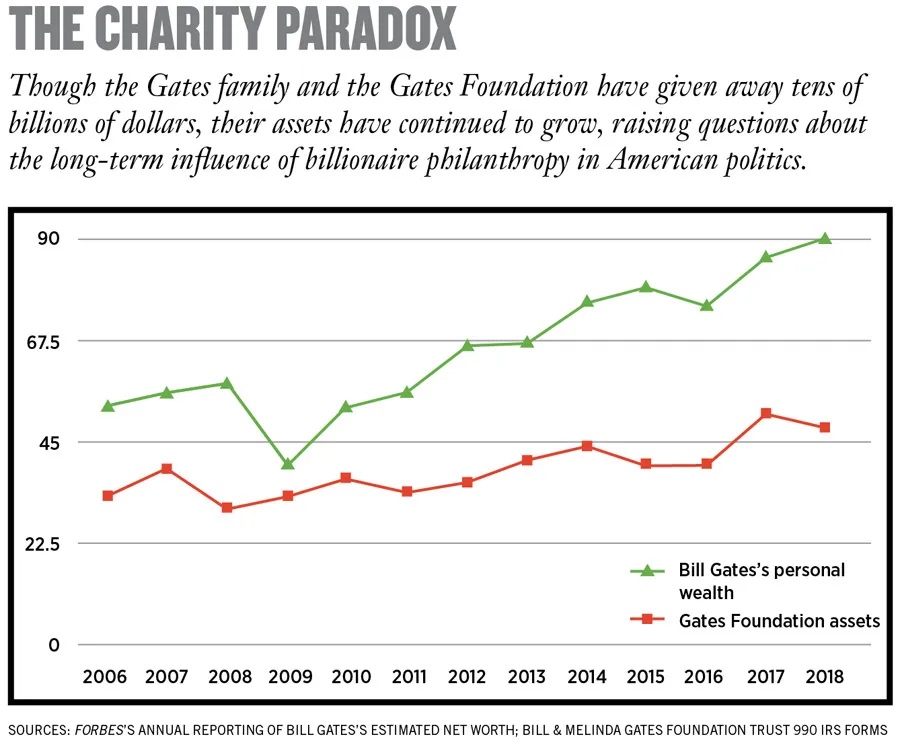
Indeed, what we see is that Bill Gates himself, and his foundation have increased in wealth despite (or in fact because of!) giving away so much money.
“For years, with the exception of tobacco companies, the foundation chose to invest in companies offering strong financial returns regardless of negative health effects…the foundation’s stake, for example, in GEO group, a leader in the for-profit prison industry…Until 2014, the foundation had a large stake in Coca-Cola and McDonald’s…The Gates Foundation has a policy of not commenting publicly on its investment decisions.”
If you really wanted to do good wouldn’t you want to put money behind companies that are profitable but are supporting your stated mission just in how they do business?
Agriculture and Nutrition
Here is one such example of their investment.
“In 2010, the foundation purchased shares in Monsanto, an investment worth about $23 million…later the foundation sold its shares in Monsanto, but it continues to collaborate on philanthropic ventures aimed at expanding the company’s presence in African markets.”
Monsanto, who is now wholly owned by pharmaceutical giant Bayer, has been rated as the most evil company in the world several times. Not just for their GMO foods, but how they then use patents on these to pressure farmers and often times run them out of business. They’ve even used an “intelligence center” to target activists, authors and others that disagree with their actions.
“In 2006, in partnership with the Rockefeller Foundation, the Gates Foundation created the Alliance for a Green Revolution in Africa (AGRA)… Bill Gates has repeatedly suggested that we need to extend the Green Revolution to Africa. His comments have sparked outrage in developing regions. Vandana Shiva, a renowned Indian environmental activist, has condemned the Gates Foundation’s links to Monsanto, calling the foundation the ‘greatest threat to farmers in the developing world’… Even unlikely figures such as Warren Buffett’s son have emerged as vocal critics of the Gates Foundation’s work in agriculture.”
Here is Shiva speaking about him:
Like the failed education reforms, the “Green Revolution” showed some early positives but longer-term has been a big failure. It enriches big companies while making the poor poorer, not just financially but health-wise too. (Witness all the lawsuits going on regarding Monsanto’s Roundup causing cancer right now.)
“The Gates Foundation has championed the idea that Coca-Cola should be upheld as a key partner in global health policy-making. In 2010, Melinda Gates gave a TED talk titled ‘What Non-Profits Can Learn from Coca-Cola,’ where she exhorted development experts to adopt the beverage giants distribution strategies….But her suggestion ignores a history of objectionable labour practices, including suggestions that the company’s subsidiaries hired a far-right paramilitary group to intimidate and murder union members at the company’s Colombian bottling plants…The foundation has also partnered with Coca-Cola…in 2010, for example, the Gates Foundation provided a $7.5 million grant to TechnoServe…to ‘create new market opportunities for local farmer whose fruit will be used for Coca-Cola’s locally-produced and sold fruit juices. Through its shares in Berkshire Hathaway, the Gates Foundation is heavily invested in Coca-Cola…when a philanthropic foundation that is heavily invested in Coca-Cola chooses to set up a charitable initiative that enlists poor farmers in cultivating fruit for Coca-Cola, the question is – does this still count as philanthropy? And if not, then why should the Gates Foundation continue to receive the generous tax exemptions it currently enjoys?”
Here we see several of the themes brought up in this article. The Gates Foundation investing in a company that is having devastating health effects the world over. The Gates Foundation using its grants in a way that benefits the company it has invested in showing a clear conflict of interest, yet getting tax benefits from doing so. And whitewashing some horrible corporate practices along the way.
Gates Foundation on Health
The thing that the Gates Foundation is doing more than anything else is vaccines. Vaccines themselves are a polarizing topics when they shouldn’t be. There should be room for the consideration that not every vaccine is great. After all how many diseases don’t have vaccines and not for lacking of trying, HIV, malaria, Lyme, coronavirus (I’m talking about the ones before this years epidemic)?
These either didn’t work at all and/or had devastating side effects.
And this doesn’t mean that all vaccines are bad either. Can we please unpolarize and talk about the risks and benefits without be immediately labeled looney anti-vaxxers?
“Donald Henderson, a former WHO epidemiologist who led the WHO’s successful campaign against smallpox during the 1960s, has suggested that polio eradication may be a misplaced pursuit: it strips money from other areas of need, forcing nations to prioritize polio immunization at the expense of vaccination coverage for other diseases. Arthur Caplan, an eminent bioethicist who himself suffered from polio as a child, has also criticized Gates’s obsession with polio eradication, pointing out that ‘government budgets and resources in poor nations are diverted from other far more pressing local problems to try and capture the last marginal cases.’…And despite vaccine research funded by the Gates Foundation and elsewhere, the difficulty of fully eradicating vaccine-derived poliovirus, a mutation of the virus contained in the oral vaccine, still lingers. ‘I can’t see myself how we can satisfactorily eliminate the vaccine-derived strains’. Henderson said. ‘I just don’t think it can be done.’”
I’ve heard various contrary viewpoints but let’s say for the sake of argument that the polio vaccine largely eradicated polio. Even so, right now it is giving some people polio! And in fact, there is more vaccine-derived polio now than there is of wild polio.
“[Bill Gates fixation on eradicating polio] seems to contradict an outspoken claim from Melinda and Bill: that they choose to invest their money where they can have the most impact in terms of lives saved. ‘We literally go down the chart of the greatest inequities and give where we can effect the greatest change’, Melinda said in 2008…In 2012, there were only 223 reported case of polio worldwide – a number that has shrunk from 350,000 in 1988, or a drop of 99 per cent. By any measure, polio eradication efforts have been highly successful even if rare cases continue to persist. And by any measure, polio is not one of the world’s greatest killers.” (emphasis added)
Should the almost half billion dollars still be going after that? Again from 2018 annual report we see over half a billion dollars going strictly to polio!
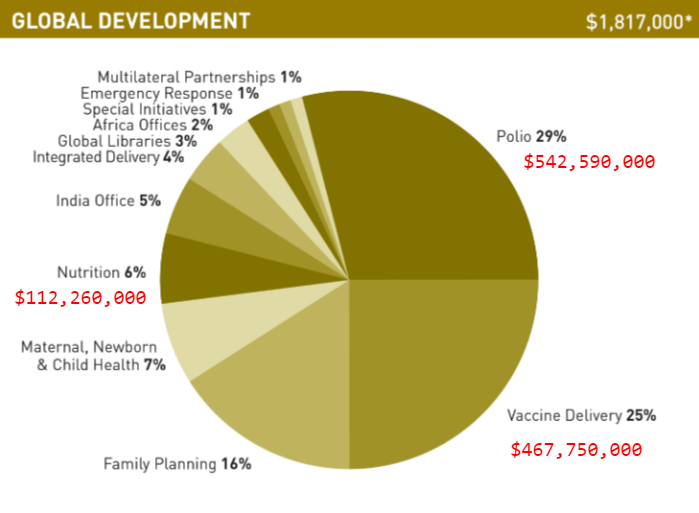
Compare that to nutrition. What about…
“In recent years, non-communicable diseases (NCDs) mainly stroke, heart disease, cancer, diabetes, and chronic respiratory disease – have become the biggest cause of death in poor and middle-income countries, outstripping deaths from infectious diseases such as tuberculosis, malaria, and HIV/AIDS. Despite the staggering cost of deaths from chronic diseases worldwide, the vast majority of philanthropic donors, including the Gates Foundation, have shown scant interest in tackling the problem. To date, the Gates Foundation has invested less than 4 per cent of funding into research on non-communicable diseases.”
Is this the smart, logical business-like focus on objectives. The objective is clearly to eradicate polio…but should it be? I think Gates wants that feather in his cap, “I’m the man responsible for eradicating polio.”
Let’s look at a different vaccine.
“The Gates Foundation has called loudly and bullishly for national governments to prioritize the inclusion of a number of different high-cost vaccines on national immunization programmes…The Gates Foundation’s funding of recent HPV trials in India is a good example. A few years ago, the foundation funded the Seattle-based NGO Program for Appropriate Technology in Health (generally referred to by its acronym PATH) to carry out ‘demonstration trials’ testing human papillomavirus in approximately 23,000 girls aged ten to fourteen in the Indian states of Gujarat and Andhra Pradesh. The two HPV vaccines distributed, Gardasil and Cervarix, are manufactured by Merck and GlaxoSmithKline respectively…Gardasil has been a top-seller for Merck, earning total global sales of $1.5 billion in 2011, a windfall for the company in the financially lean years that had plagued it since it emerged that the company had manipulated trial data for Vioxx, its bestselling painkiller drug linked to heart failure in tens of thousands of users. Merck pleased to criminal charges…When Gardasil was first in production, Merck sales team reportedly had a catchy unofficial nickname for the HPV vaccine: Help Pay for Vioxx…[PATH] began a two-year vaccination drive in 2009. Most of the vaccines were given to girls at ashram paathshalas (boarding schools for tribal children), sidestepping the need to seek parental consent for the shots…[A parliamentary committee] found that PATH had violated ethical guidelines in a number of alarming ways…PATH has justified this omission by insisting that the vaccine trials were ‘demonstration trials’, and therefore subject to looser safety requirements thana standard clinical trial. The parliamentary report into the vaccine trials lambasted that rationalization, stressing that the HPV trials should have been deemed a clinical trial because it was a ‘study of a pharmaceutical product carried out on human participants’ and ‘four of five primary outcome measures proposed in the study related to evaluation of the safety of the vaccine’. In 2010, the Indian Council of Medical Ethics admitted that its own ethical protocols had been flouted in permitting the trials. In August 2013 a separate parliamentary committee reiterated the severe criticism of PATH, stating that the NGO’s ‘sole aim has been to promote the commercial interests of HPV vaccine manufacturers who would have reaped windfall profits had PATH been successful in getting the HPV vaccine included in the UIP [universal immunization program] of the Country.’” (emphasis added)
I previously covered the topic of so-called “informed consent” in my article on the WHO. I don’t know about you but I do not believe people should be part of medical experiments without knowing it.
This is a good one to further investigate conflicts of interest.
Referring to some pictures of Schwab’s article The Nation, note the conflicts of interest in the above named pharmaceutical companies (actually pretty much all of them). There’s Merck and there’s GlaxoSmithKline.
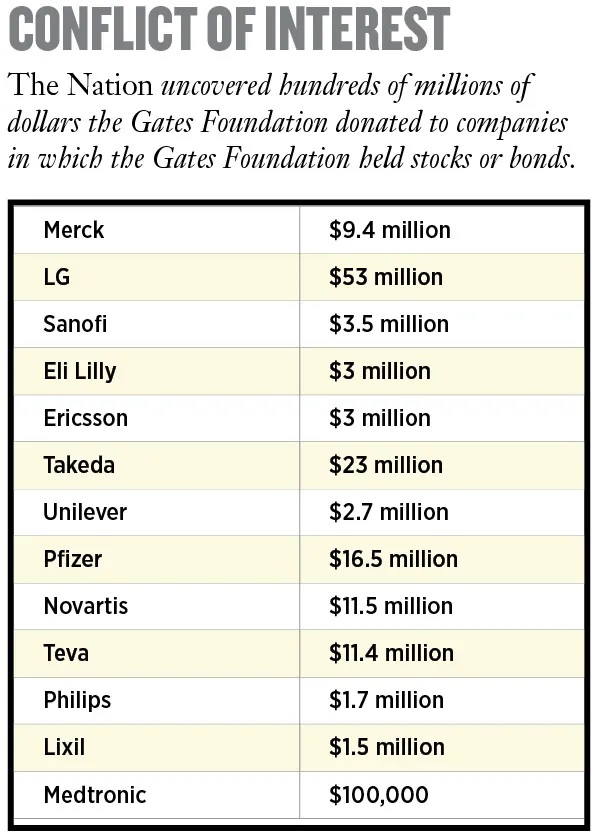
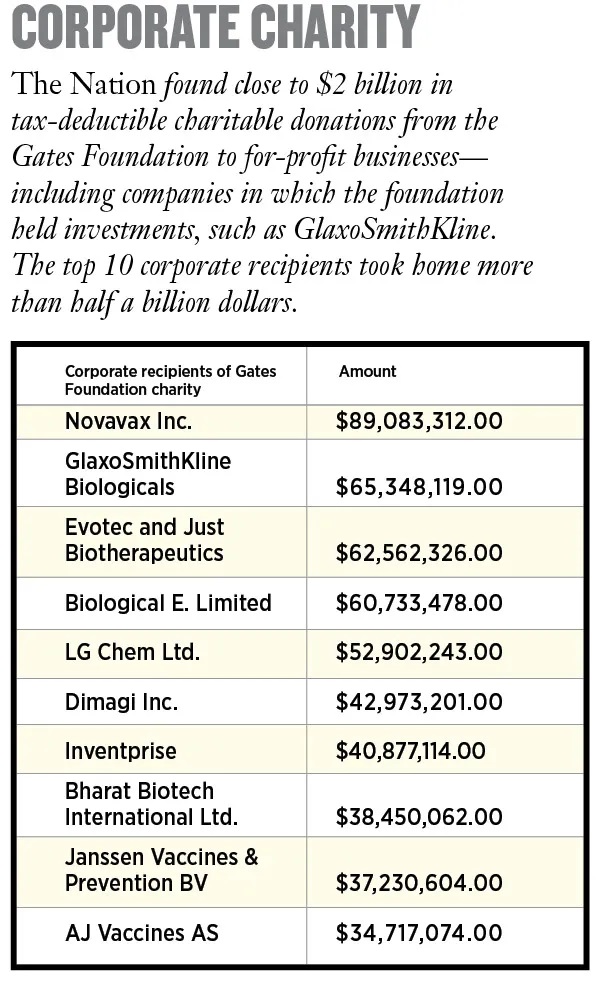
Understand the complex web that is woven. The Gates Foundation owns stock in Merck. It gives tax-deductible grants to GSK. It funds another NGO called PATH which then uses products from Merck and GSK in trials, in an attempt to get a product mandated form every single person in a country!
Look at all the health organizations the Gates Foundations funds, which helps set these policies, and how many pharmaceuticals the Gates Foundation is involved in.
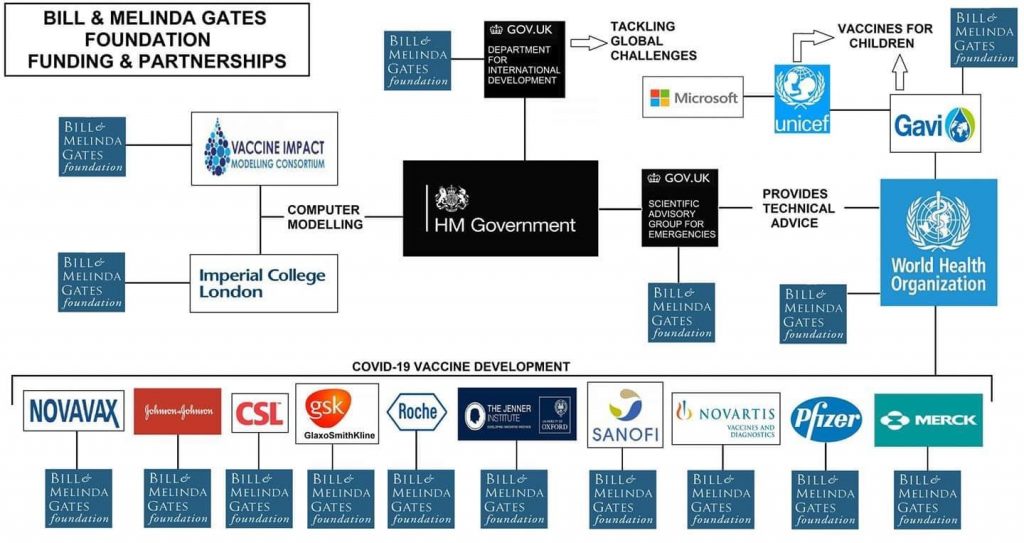
Any image is going to be just a small part of the picture.
If you think that conflicts of interest can sometimes be problematic then this definitely needs more investigation.
Concluding Thoughts
“A young health researcher based at the University of Cape Cost, in western Ghana, echoed the sentiment: ‘From my point of view, it’s more like [the Gates Foundation] are selling technology than solving problems. Most of their calls have to do with developing some new technology or vaccines.”
This sounds to me a lot like what Bill Gates himself in that Netflix special said as I covered previously. “Any problem I will look at how technical innovation can help solve that problem. It’s the one thing I know and the one thing I’m good at. And so, you know, that’s my hammer. Uh…And so lots of problems look like nails because I’ve got a hammer.”
Look, I have no clue if Bill Gates is really evil at heart. But I can not blindly trust the man as his PR seems to have most people doing.
This man has far too much power and philosophically, I don’t see technology as the answer to all our problems, considering technology created many of them! Geoengineering and blocking out the sun are not good answers to environmental problems. GMO mosquitoes are already out now as if there’s no possibly negative consequences to that. The stuff he wants to do, is doing, is crazy so is it any wonder people are up in arms about it?
The only way I see to stop him is to #exposebillgates so that enough people do not consent to his plans.
Knowledge is power which is why propaganda is powerful. But due to polarization if we’re going to convince people we can’t dive off the deep end. Start with some basics facts like:
- Making tax-deductible donations to for-profit companies he’s invested in, a clear conflict of interest.
- Or that despite giving away his fortune, he’s richer than ever now.
- Or his foundation’s investments directly contradict what they say they’re trying to do in health.
Get the conversation going. Someday we’ll be able to talk about things in an open and honest way. At least I hope so.
If not, it does look like we have an even more tightly controlled future in front of us.

